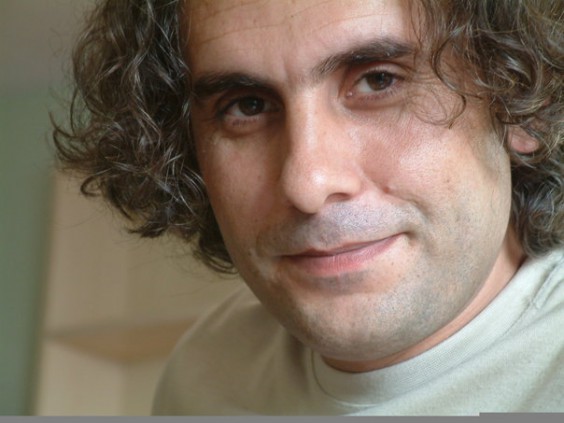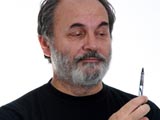The Rise of Kurdish Literature
by Tarık Günersel / September 26, 2014 / 1 Comment
Tarık Günersel and Selim Temo in a conversation on Kurdish literature.

Selim Temo. Photo provided by the author.
The Princeton Encyclopedia of Poetry and Poetics is a treasure that would be richer if it included an entry on Kurdish poetry. Who could write a sufficiently succinct, and yet comprehensive, article? Selim Temo, Ph.D., who prepared a 2-volume anthology of Kurdish poetry in 2007, would be an ideal candidate for the task. He is my guest in this column.

- Life is words in action, literature is action in words.
- Humans are about to destroy their spaceship Earth. Some of them are aware of this and they try to change the course of events. Will they succeed? Will more humans be alarmed and do something?
- Literature is vital and translators are messengers of world peace.
- Though I shall focus on the literary scene in Turkey and its problems regarding freedom of expression, I shall not omit the other parts of our planet. Today local is global and vice versa.

- Tarık Günersel is a poet, playwright, aphorist, librettist and short story writer. He is the president of PEN Turkey and an ex-member of the PEN International Board. He studied English Literature at Istanbul University. A self-exile after the military coup in 1980, he spent four years in Saudi Arabia with his wife Füsun and their daughter Barış, teaching English. A dramaturg at Istanbul City Theater since 1991, he has acted on stage and screen and directed some of his plays. He proposed World Poetry Day in 1997 which was accepted by PEN International and declared by UNESCO as the 21st of March. His translations into Turkish include works by Samuel Beckett, Vaclav Havel and Arthur Miller. His works include The Nightmare of a Labyrinth (mosaic of poems and stories), and How’s your slavery goin’? His Oluşmak (To Become), a “life guide for myself,” includes ideas from world wisdom of the past four millennia. He has recently initiated the Earth Civilization Project with the support of several intellectuals from various parts of the planet.
Temo is a leading Kurdish academic, poet, novelist, researcher, literary historian, translator and a member of PEN Turkey Centre and Kurdish PEN. He selected the poems in the Anthology of Kurdish Poetry and published them in Kurdish and Turkish. Born in 1972, Temo holds a B.A. in Social Anthropology and Ethnology, and a M.A. and Ph.D. in Turkish Literature. He won awards for his 1998 novel Çiftlere Cinayet Dersleri (translated as Lessons in Killing for Couples) and his 1997 poetry collection, Kirgin Nehirler Meseli. The Hrant Dink Foundation chose him as “one of the Lights of 2011 who increase our hope for the future.” Temo visited the University of Exeter’s Centre of Kurdish Studies as a research fellow. He has written thirty books in a range of genres: poetry collections in Kurdish and Turkish, a children’s book, translations, literary criticism, an academic publication, and the aforementioned anthology. Recently, Temo attempted to establish a department of Kurdish Language and Literature at Artuklu University in Mardin, but Turkey’s government blocked his efforts.
Do you think Kurdish literature is sufficiently known on international level?
On the contrary, among the many literatures of oppressed peoples, it is the least known.
Why is that?
For a long time, no matter which alphabet was used, writing a Kurdish literary text was enough reason to be prosecuted or even killed. Thanks to the nearly century-old freedom struggle by the Kurdish people, the situation has recently relatively improved. Pieces of Kurdish literature have begun to emerge from darkness.
When did Kurdish literature begin?
In 856 CE, Ibn Vakhshiye mentioned in his book that he had seen at least 30 books in Kurdish and Meddish. He wrote that he had translated two of them into Arabic.
The Yarsan, a syncretic religious group, considered the works of Baluli Dana, a Kurdish poet, to be sacred texts.
The earliest Kurdish woman poet was Celale Xanima Loristani (Lady Jalile from Loristan), who died in 935. It may be surprising, but there were many female poets in those times.
Could you describe the classic period of Kurdish poetry?
Islam became dominant among Kurds, and the classic age began in the 13th century. Shami Kirmashani initiated the movement, and the last master was Eli Heriri. The movement included interactions between dialects, and each dialect had its own peak. The four main dialects of Kurdish are Kurmanji, Zazaki, Sorani, and Gorani. We see a high peak with Ell Heriri writing in the Kurmanji dialect. In the Sorani dialect, the classic period began with Nali in the 18th century. As for the Zazaki dialect, the classic period began in the late 19th century.
What are the characteristics of Kurdish classical poetry?
It is open to interpretation. Ehmedê Xanî’s (1651-1707) poems implied seeds of nationalism. Melayê Cizîrî (1570-1640) had a complicated style, Feqiyê Teyran (1590-1660) had a mystic approach, Girgaşî (17th century) used incredibly naturalistic language, and Xilwetî (1588-1674) had a dazzling imagination. Those names constitute the basic outline of classical Kurdish poetry.
Who were the forerunners of modern Kurdish literature?
Mewlewi Kurd (1806-1882) and Mele Mehmudê Bazidî (1797-1870) were the leaders of modern Kurdish literature. Bazidî, who wrote twenty-five books, was especially important. Some literary historians, such as Ferhad Pîrbal, argue that the genre of short story began in Kurdish with Bazidî.
How about journalism?
The first Kurdish newspaper was published in 1898. The first Kurdish publishing house was founded in 1915.
Drama?
The first modern Kurdish play was written in 1918.
So the Kurdish literary circles were ready for the new age.
Indeed. But the Kurdish land was – and is — divided among Iraq, Iran, Syria and Turkey. And governments of these four countries were extremely oppressive against the Kurds. Therefore, Kurdish literature flourished only when and where some breathing space was possible. Armenia and the Kurdistan part of Iraq have been relatively favorable in terms of publication. So it’s been possible to publish literature and journalism in the Kurmani and Soranî dialects. Today, there is a considerable Kurdish literary society.
What was the first Kurdish novel?
Erebê Şemo (1897-1978) wrote Şivanê Kurmancan (The Kurdish Shepherd), which was published in 1935.
What would you like to mention about linguistic and literary studies of Kurdish literature?
In Syria, when it was under French rule, an important group of writers-in-exile gathered and was very fruitful in such studies, especially in Damascus and Beirut. The first names that come to mind are Celadet Alî Bedir-Xan (1893-1951), Cegerxwîn (1903-1984), Osman Sebrî (1905-1993), Nûredîn Zaza (1919-1988) and Reşîdê Kurd (1910-1968).
Exile is a global trauma.
In second half of the 20th century, exile was like arriving at destiny for Kurdish authors. They utilized their interactions to minimize the differences among the dialects. Mahmut Baksi (1944-2000), Mehmed Uzun (1953-2007), Şêrko Bêkes (1940-2013), and the living writers Ebdulla Peşêw, Mehemed Malmîsanij, Helîm Yûsiv, Jan Dost, and Hesenê Metê are some important names from this era.
I visited Mehmed Uzun in Diyarbakır in the summer of 2007, a meeting arranged by Şeyhmus Diken, the Diyarbakır Representative of PEN, and Lal Laleş, the founding editor of Lîs Publishing House. Uzun’s untimely death from cancer still hurts.
Although there is still pressure in various places, it is possible to say that Kurdish literature is on the rise overall. Especially with the novels of Bextiyar Elî, Lokman Ayebe, Ciwanmerd Kulek, Şener Ozmen, and Ata Nehayî; the short stories of Roşan Lezgîn, Murad Canşad, Lorin Dogan, and Îsmaîl Dîndar; and the poetry of Kawa Nemir, Rênas Jiyan, Welat Dilken, and Osman Mehmed.
Kawa Nemir has translated all the sonnets of Shakespeare into Kurdish.
I am sure Nemir is among the most prolific literary figures in the world. So many works of Kurdish literature deserve to be translated into many languages, as well as many works being translated into Kurdish.
They certainly do.
After a century of concrete and abstract prisons, we are observing the return of Kurdish literature. A brilliant future is in sight.
Thanks to Selim Temo for this interview. I would like to recognize the Lîs Publishing House in Diyarbakır, which has been fruitful in terms of Kurdish literary works and their Turkish translations. Lîs has also published bilingual editions, embracing Turkish literature with translations into Kurmani, the most widely spoken Kurdish dialect.
“Literature in Kurdish” and “Kurdish literature” are two spheres, which do not totally overlap. As with Irish literature, whose authors wrote not only in Irish Gaelic, but in Latin and English – or, in Samuel Beckett’s case, English and French – some Kurdish authors write in Turkish. Nevertheless, their works echo the Kurdish experience and their works are a part of Kurdish literature.
If there can ever be peace on Earth, it will partly be the result of literature, which helps us to understand others – and thus ourselves – better.
Multiculturalism is not limited to geographical space. Today, each person is multicultural.





One Comment on "The Rise of Kurdish Literature"
Trackbacks for this post